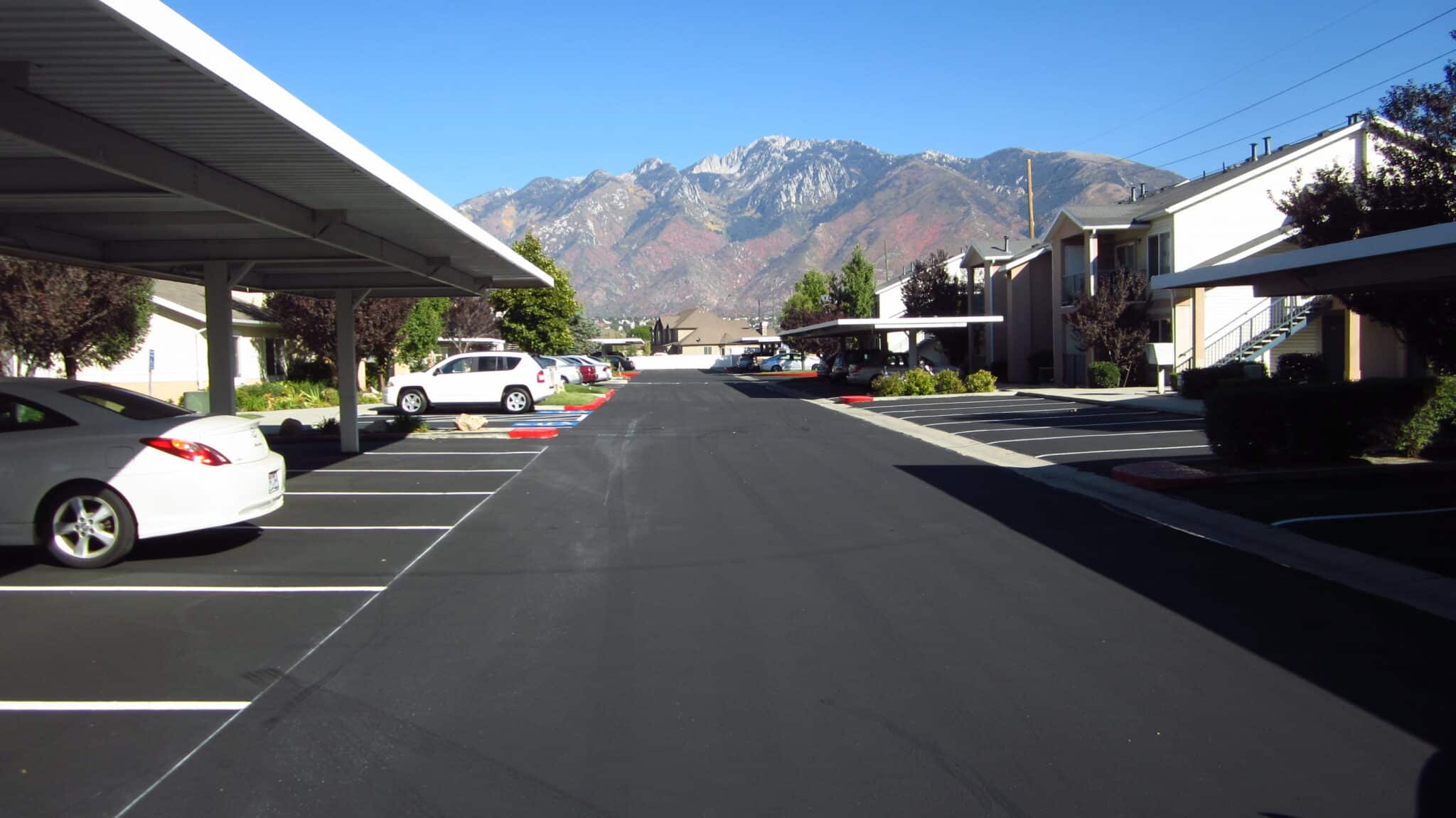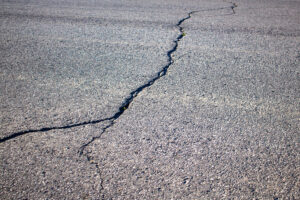New asphalt pavement can last 18 years without maintenance.
With maintenance, low traffic volume asphalt, like parking lots and driveways, can last longer – up to 40 years. It depends on how they were initially installed. It also depends on you.
As a property or facility manager, you are the key person in coaxing a few more years out of your asphalt pavement. Don’t let your asphalt inexperience cause more expensive problems down the road. To better understand the scope of asphalt maintenance, here are a few things property managers should know:
8 Asphalt Maintenance Tips for Property Managers
1. Regular Cleaning is Important
Asphalt maintenance starts with cleaning. Clear away trash, debris, and even dirt from the driveways, parking lots, and private roads that you oversee. Clean parking lots are proven to enhance curb appeal and discourage littering. Further, a clean parking lot deters rodents and pest problems.
For property managers, this means regular trash pickup – of all items, big and small. Secondly, it means picking up debris from trees, shrubs, and other plants, whether it immediately looks like a danger to passersby or not.
Leaving dirt and yard debris on the pavement surface may not seem like a big deal, but it is. Just add water and you get erosion. From there, erosion leads to asphalt cracks and substructure damage, which can affect large areas of your parking lot or driveway if left alone.
Read more: Expert Asphalt Cleaning Tips
2. Perform Preventive Maintenance
Asphalt preventative maintenance aims to nip future problems in the bud. Depending on the size of cracks that you see, different solutions are needed. Generally, cracks plus dirt and debris lead to potholes. Bigger, more substantial cracks and potholes are more costly to repair.
So, even the smallest cracks measuring ⅛ of an inch should be identified and watched for changes.
Read more: Seasonal Asphalt Maintenance Guidelines
3. Fill and Seal Asphalt Cracks
Moisture can weaken asphalt’s substructure. It’s the biggest cause of asphalt pavement deterioration. Consequently, cracks bigger than ⅛ inch should be filled and sealed. Asphalt crack sealing prevents water from getting into the asphalt and causing further damage. Most importantly, asphalt pavement with sealed cracks holds up much better over time than pavement with unsealed cracks.
On the other hand, larger cracks with edge deterioration, those in worn pavement, and pavement areas with numerous cracks require individual filling techniques. Furthermore, various situation-specific preparations and asphalt sealants are needed, depending on the cracking. At the end of the day, while you can still treat larger cracks, it is less cost-effective to catch cracks later.
Read more: Why Asphalt Cracks Form (And Why You Should Seal Them ASAP)
4. Repair Damaged Asphalt
What if asphalt cracks are too big to seal? Cracks that are too wide or too extensive to be effectively filled or sealed against future damage will need to be removed and patched.
Asphalt repair and maintenance work together to make your investment last longer. It costs much less to have a portion of your asphalt parking lot or driveway removed and replaced than it does to replace the whole thing.
Read more: 5 Common Types of Asphalt Damage and How to Repair Them
5. Protect with Seal Coating
Another common preventative measure is asphalt seal coating, commonly used on parking lots and driveways. As oils in new asphalt pavement oxidize, pavement gets harder and harder. It can also become brittle if it is left bare to oxidize for too long. For this reason, newly laid asphalt should be seal coated in its first year and re-sealed every three to five years.
Seal coating is pavement surface treatment. It provides an extra layer of protection, from the sun, water, oil, and other harmful elements that, with prolonged exposure, lead to the earlier breakdown of asphalt pavement. Its goal is to seal the surface, replace some of the lost oils over time, and protect the surface itself. Seal coating also has the benefit of making your parking lot or driveway look uniform in color again, with a dark blacktop finish.
Read more: Parking Lot Sealcoating Is Vital. Here’s Why…
6. Seal Coating Alone Isn’t Enough
Seal coating doesn’t take the place of all other repairs. It isn’t a crack sealer. This sealant serves a different purpose. It should used be in conjunction with crack sealing and remove-and-replace pavement repairs and pothole patching. For a seal coat to be most effective, a damaged area or pothole needs to be removed and re-laid by an asphalt contractor first. This is crucial to understand when it comes to asphalt pavement maintenance.
Read more: Does Sealcoating Fill Cracks?
7. Re-Stripe Parking Lots
Beyond asphalt pavement repair, there is still another key area of parking lot duty: striping. No matter the parking lot size, striping is essential. It directs the flow of traffic, enhances safety, and keeps restricted areas, like loading docks, clear. Furthermore, updating your striping can help wear the asphalt more evenly, for a longer life.
Read more: Why Parking Lot Sealing and Striping Go Hand in Hand
8. Consider an Asphalt Maintenance Partner
A commercial asphalt maintenance company can help with residential driveways, as well as commercial properties. If you don’t have a driveway or parking lot maintenance schedule, Superior Asphalt, LC can help. We offer asphalt maintenance and striping services in five western states: Arizona, Colorado, Nevada, Utah, and Wyoming. Request a quote today.




